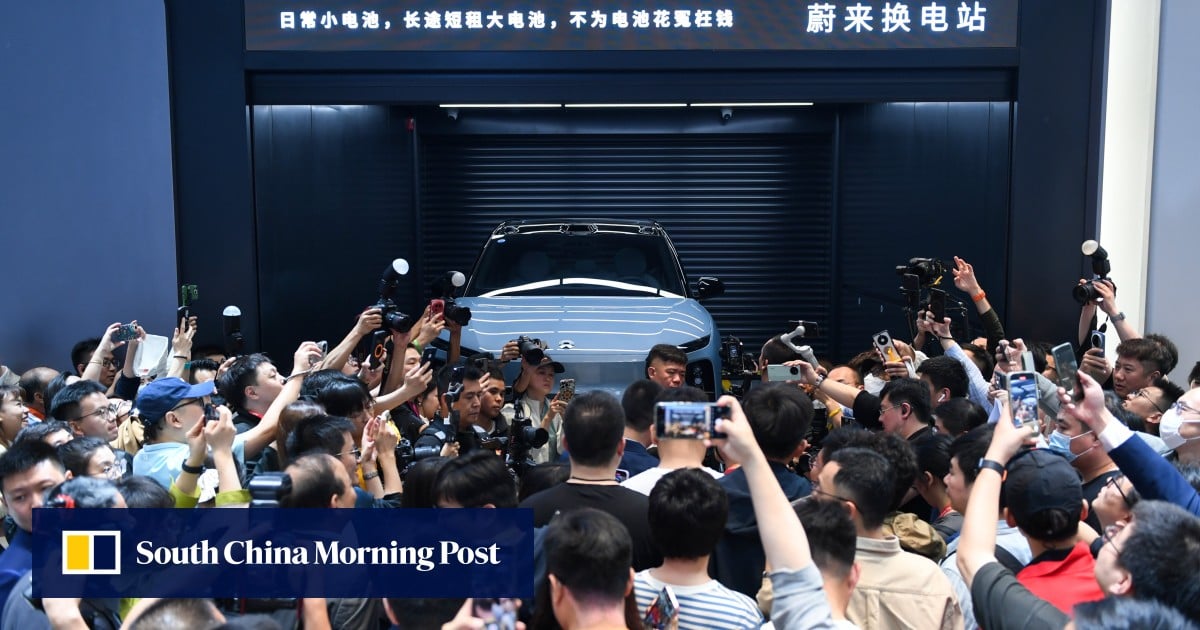Li Auto, Xpeng and Nio, China’s top three premium electric vehicle (EV) makers, posted mixed sales in April, as companies remain entrenched in a price war in the world’s largest car market that shows no signs of ending.
Beijing-based Li Auto, mainland China’s nearest rival to Tesla, delivered 25,787 vehicles last month, an 11 per cent month-on-month decline but 0.4 per cent higher from a year earlier, the company said on Wednesday. Cumulative deliveries reached 106,187 units in the first four months of the year, 35.6 per cent higher from a year ago.
Guangzhou-headquartered Xpeng delivered 9,393 vehicles last month, up 4 per cent from a month earlier, and 33 per cent more than a year earlier. Overall deliveries year to date reached 31,214 units, 23 per cent higher from a year earlier.
Shanghai-based Nio had the best month among the trio. Deliveries jumped 31.6 per cent month on month to 15,620 units in April, and 134.6 per cent higher year on year. Year to date sales reached 45,673 vehicles, 21 per cent more than a year earlier.
EV makers in mainland China are pulling out all the stops, including price cuts and promotions, to grow sales and market share at the cost of profitability, analysts said. This is likely to descend into a brutal price war, leading to further consolidation, they added.
Xpeng was affected the most because its models are priced in the 200,000 yuan (US$25,565) to 300,000 yuan range, the most crowded segment of the market, said Phate Zhang, founder of CnEVPost, a Shanghai-based EV data provider.
Nio and Li Auto were less affected by the price war as their models are targeted at a more premium segment, he added.
Li Auto’s deliveries were hit by the lower-than-expected sales of the Li Mega, the company’s first fully electric minivan, as well as other models launched in March, according to Zhang. “The company’s executives were over-optimistic and misjudged the situation.”
Li Auto’s Li L6 is displayed at the Beijing International Automotive Exhibition in April. Photo: Reuters
The carmaker also introduced the Li L6, its cheapest model, from 249,800 yuan onwards. It priced the car more than 5 per cent cheaper than Tesla’s bestselling Model Y.
Deliveries are expected to start this month, said Li Xiang, chairman and CEO of Li Auto.
During the Labour Day “golden week” holiday, Li Auto will provide its users with complimentary charging services and cover the electricity costs at all its supercharging stations, he said in a statement on Wednesday.
Nio’s strong performance may be related to the price adjustment and promotions of its battery rental service in March, according to Zhang. “The strategy has allowed Nio to deal with the price war without having to lower its vehicle prices. It’s a very clever move,” he said.
Xpeng, which has long touted its smart driving technology, said the monthly active user penetration rate of its XNGP autonomous driving technology in urban driving scenarios reached 82 per cent.
It also conducted tests of its autonomous driving functions on the highways in Germany last month, with plans to roll out the technology in overseas markets.
Shenzhen-based BYD, the world’s largest EV maker, said on Monday it sold 313,245 plug-in hybrid vehicles and pure battery EVs in April, 3 per cent higher month on month, and nearly 50 per cent more from a year earlier.
Some 43 per cent of the cars sold last month were battery-powered EVs while the rest were plug-in hybrids.





